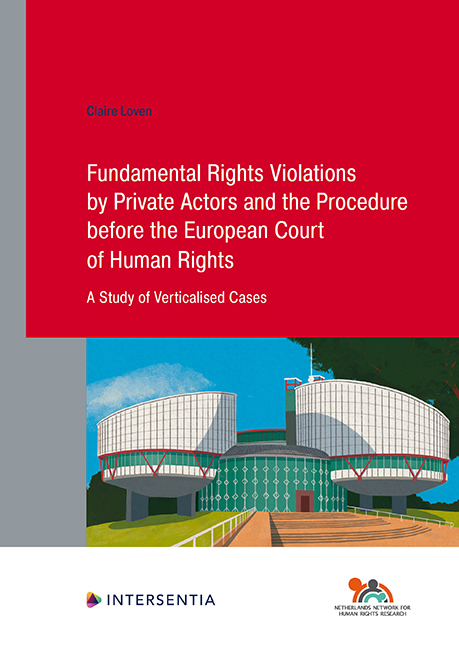 Fundamental Rights Violations by Private Actors and the Procedure before the European Court of Human Rights
Fundamental Rights Violations by Private Actors and the Procedure before the European Court of Human Rights The first three parts of this study provided an introduction to the Convention system and an analysis of the characteristics of verticalised cases and the Court's approach to them, and identified problems arising in verticalised cases. To address the problems identified in Part III, the fourth and final part of this study outlined a new approach to verticalised cases, while taking account of the characteristics of the Convention system in general and of verticalised cases in particular.
This proposed new approach to verticalised cases consists in redesigning the thirdparty intervention procedure. On the basis of the current third-party intervention procedure, as laid down in Article 36 ECHR and as discussed in Chapter 9, private actors involved in the conflict at the domestic level (i.e. the disappeared party) may be granted leave to intervene in the Court's proceedings. To build on the potential of this existing Convention instrument, while also making it fit to address the problems arising in verticalised cases, it was proposed redesigning the third-party intervention procedure so as to grant actual third parties a right to intervene in the Court's proceedings. This means that actual third parties with a legal interest in the case before the Court will no longer depend on the Court's discretion to intervene in its proceedings. Instead, providing they were involved in the conflict at the domestic level, their human rights interests are in conflict with the rights and interests of the applicant, and these interests are protected by the Convention, they will have a guaranteed opportunity to defend or explain their acts, interests or rights in the Court's proceedings. To ensure that this opportunity is genuine and effective, the proposal contains suggestions for the procedural scope of the right to third-party intervention, for becoming aware of the Court's proceedings, and for third-party submissions and the Court's reasoning.
As well as creating a genuine and effective opportunity to participate in the Court's proceedings, the aim was to create a situation that is workable both for the Court and the Convention States. To this end, the personal scope of the envisaged right to thirdparty intervention was clearly defined and limited, with attention also being paid to the length of third-party submissions and finding an appropriate balance between the need to make actual third parties aware of the Court's proceedings and the burden this will put on Convention States and the Court.
To save this book to your Kindle, first ensure [email protected] is added to your Approved Personal Document E-mail List under your Personal Document Settings on the Manage Your Content and Devices page of your Amazon account. Then enter the ‘name’ part of your Kindle email address below. Find out more about saving to your Kindle.
Note you can select to save to either the @free.kindle.com or @kindle.com variations. ‘@free.kindle.com’ emails are free but can only be saved to your device when it is connected to wi-fi. ‘@kindle.com’ emails can be delivered even when you are not connected to wi-fi, but note that service fees apply.
Find out more about the Kindle Personal Document Service.
To save content items to your account, please confirm that you agree to abide by our usage policies. If this is the first time you use this feature, you will be asked to authorise Cambridge Core to connect with your account. Find out more about saving content to Dropbox.
To save content items to your account, please confirm that you agree to abide by our usage policies. If this is the first time you use this feature, you will be asked to authorise Cambridge Core to connect with your account. Find out more about saving content to Google Drive.